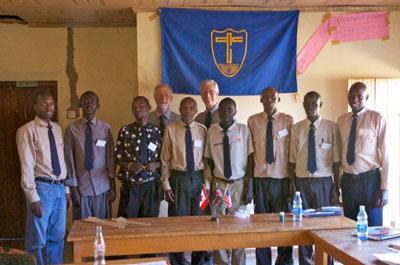Cadets Grow in Kenya

Although the Calvinist Cadet Corp is only a few years old in Kenya, the East African country already has 30 clubs, making it third on the list of clubs worldwide.
Only the United States and Canada have more of the clubs that are affiliated with youth ministries approved for support by the Christian Reformed Church.
Meanwhile, Calvinist Cadet Corps clubs in Kenya have taken on a range of extensive service projects as part of their program.
Typically, cadets work to earn merit badges in a variety of areas such as prayer, witnessing, fire safety, money management, map reading, and the Christian way, which involves training on the need to do outreach projects.

In Kenya, cadets take part in these merit-badge programs. But they have also gotten involved in extensive projects such as digging a well, building a two-room structure for a Cadet club, starting a program to raise chickens for eggs to take to market, and planting trees whose wood cadets hope to harvest and sell.
"I was surprised to see that they were involved in projects that are so demanding . . . and that they have goals that go far beyond working on merit badges and Bible lessons. They really want to affect their churches and communities," says Dick Broene, the Calvinist Cadet Corp executive director, who recently traveled to East Africa for a conference of Kenyan Cadet counselors and leaders.
"I was also surprised and pleased to see how seriously the individual churches take this ministry. Many of the churches have established committees to oversee their Cadet programs."
The conference that he attended focused on Cadet materials that Kenyans are adapting to better fit their circumstances. Broene made the trip with Mike VanderMeer, president of the Calvinist Cadet Corp.
Clubs in Kenya are able to do some of the extensive work that they do with support from churches or church groups with whom they have been paired in North America
The clubs in Kenya are directed by Daniel Nandwa, youth director for the Reformed Church of East Africa. Broene connected with Nandwa about 2004 when Nandwa was attending Bible school in Grand Rapids.
When Broene first visited Kenya, he spoke to church leaders about the value of the clubs, but it was the crafts, especially kite-making and a simple rope-jumping game, which grabbed the interest of the boys and helped lead to the commitment to bring the program to Kenya.
The games, he said, showed Kenyan adults that they could maintain their adult role as leaders in guiding the youth and at the same time they could have fun with the boys.
"Cadets are about building relationships. It is so important that we befriend the boys," says Broene. "We're still the leaders, but that doesn't mean we can't have fun together."
In his three visits to Kenya, Broene has visited several of the clubs, although to get to some has taken many hours of travel over bumpy, pothole-filled roads.
"They have taken Cadets very seriously and have made sure that the boys have good uniforms that they can wear when they are meeting. They are very proud of their uniforms," Broene said.
Some of these blue-and-black uniforms are even tailored, and the boys take them off as soon as they are finished with a Cadet activity.
"We have found that there is growing interest among other denominations in Kenya who might want to get involved in a Cadet program," said Broene.
During his recent trip, Broene saw some of the devastation that has come as the result of riots following elections in the country over the last few years. But, in talking to Kenyans, he found that the destruction was mainly in certain areas that erupted and then, after a time, grew calm.
There are also Cadet clubs in Australia, New Zeeland, Spain, and Uganda.


